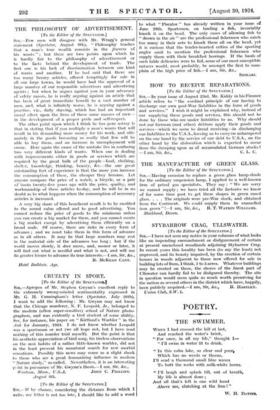THE PHILOSOPHY OF ADVERTISEMENT.
[To the Editor of the SPECTATOR.] SIR,—Few men will disagree with Mr. Wragg's general statement (Spectator, August 9th), "Philosophy teaches that a man's true wealth consists in the fewness of his wants" ; but there are two points upon which he is hardly fair to the philosophy of advertisement or to• the facts behind the development of trade. The first one is his lack of discrimination between one kind of wants and another. If he had said that there are too many luxury articles, offered temptingly for sale in all our large towns, he would have had the approval of a large number of our responsible advertisers and advertising agents ; but when he argues against you in your advocacy of safety razors, he is really arguing against an article that has been of great immediate benefit to a vast number of men, and, what is infinitely worse, he is arguing against a practice, viz., daily shaving, which has had an important moral effect upon the lives of these same masses of men— in the development of a proper pride and self-respect.
The other point upon which I think he has gone astray is that in stating that if you multiply a man's wants that will result in his demanding more money for his work, and ulti- mately in the goods becoming so costly that few will be able to buy them, and an increase in unemployment will ensue. Here again the cause of the mistake lies in confusing two very different kinds of wants. When one is dealing with improvements either in goods or services which are required by the great bulk of the people—food, clothing, shelter, knowledge, thinking, beauty, &c.—the one great outstanding fact of experience is that the more you increase the consumption of these, the cheaper they become. Let anyone compare the price of a watch, a bicycle, or a pair of boots twenty-five years ago with the price, quality, and workmanship of these articles to-day, and he will be in no doubt as to what happens when the consumption of necessary articles is increased.
A very big share of this beneficent result is to be credited to the sound value offered and to good advertising. You cannot reduce the price of goods to the minimum unless you can create a big market for them, and you cannot create a big market except by advertising them efficiently on a broad scale. Of course, there are risks in every form of advance ; and we must take them in this form of advance as in all others. It may be that large numbers may rest in the material side of the advances too long ; but if the world moves slowly, it does move, and, sooner or later, it will find out what is needful and what is not, and will use its greater leisure to advance its true interests.—I am, Sir, &c., Hotel Dalblair, Ayr. R. MCKEAN CANT.


































 Previous page
Previous page